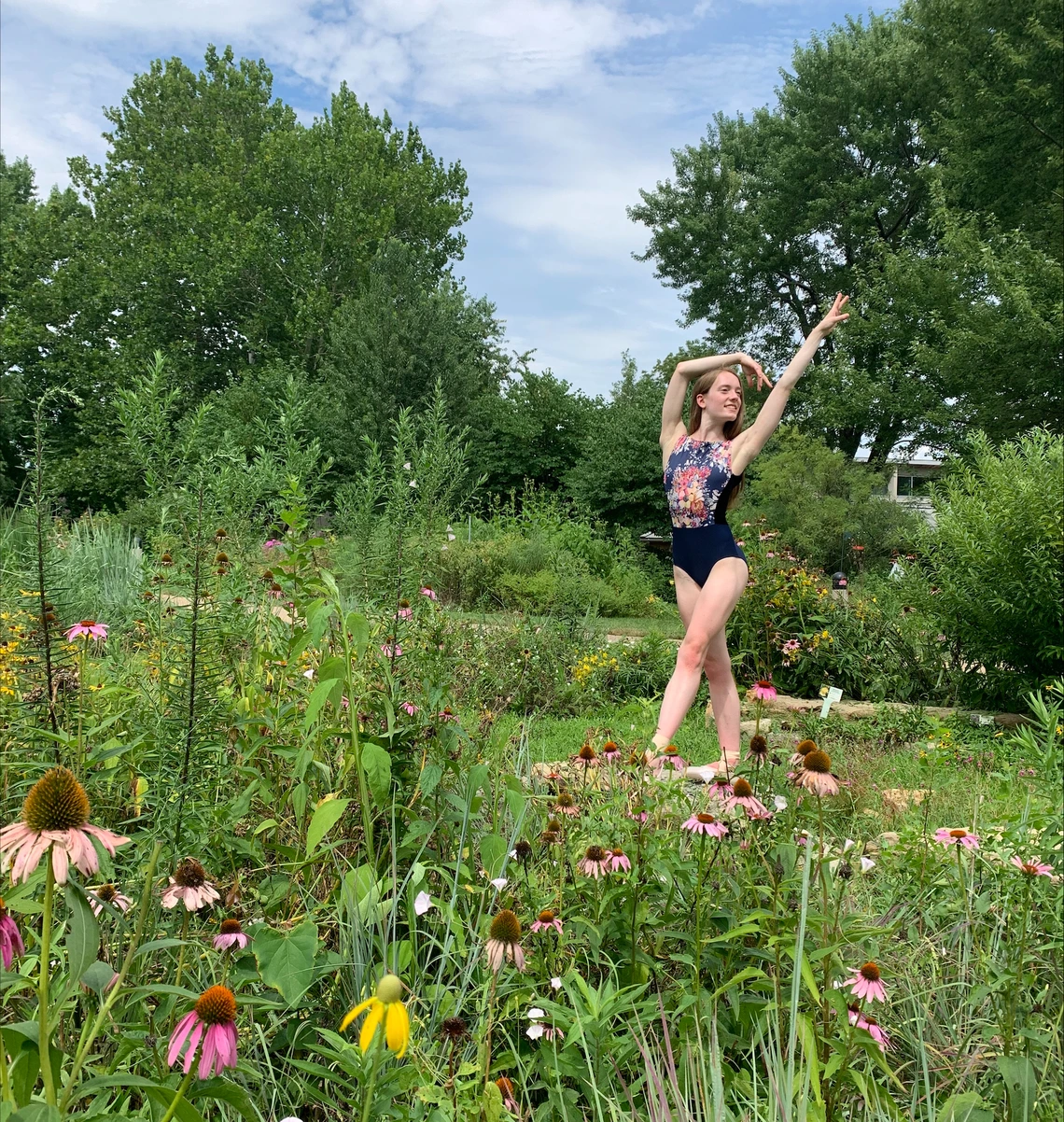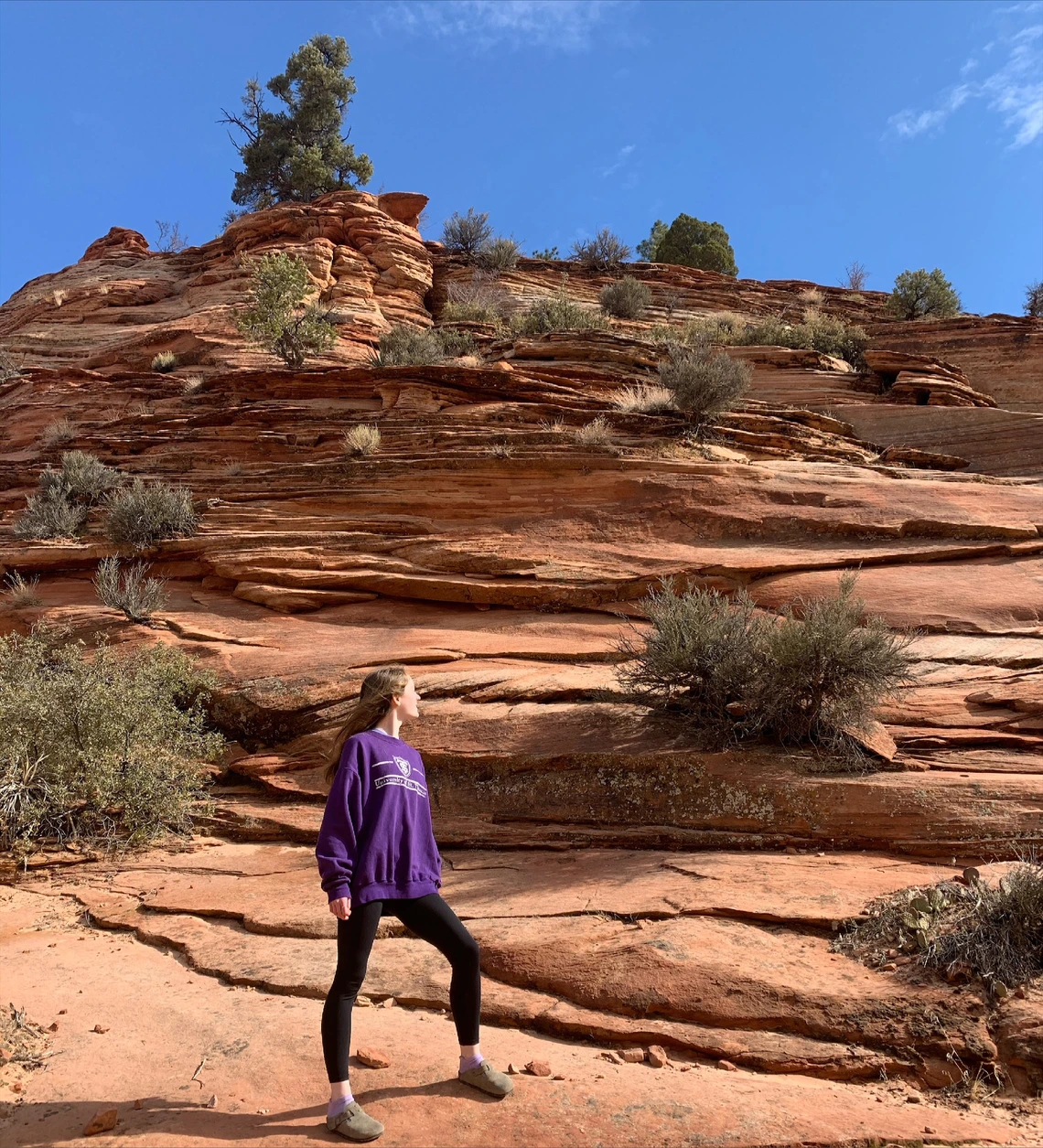Katie Sweet: Dancing a duet with the planet

A University of Arizona junior majoring in biosystems engineering and dance, Katie Sweet embraces crossing disciplines and exploring new opportunities.
As a member of Students for Sustainability, first as a HydroCat and subsequently as the marketing chair, Sweet helped with grant-writing for a food forest and rainwater reclamation system at Biosphere 2 and installing irrigation at the University of Arizona Community Garden. She volunteered with ProjectWET and Saguaro National park, teaching fourth graders about watersheds and earning a Saguaro Stewardship Certificate, respectively. Additionally, Sweet has participated in the Diana Liverman Scholars Program and the agrivoltaics Vertically Integrated Program.

“I met many smart, hilarious, and singular individuals who grew to be my friends,” Sweet said. "The great community we formed kept me engaged and motivated to keep pursuing sustainable work."
In this Q&A, Sweet discusses the influences of her various academic and extracurricular experiences on her understanding of sustainability, as well as how she has found meaning and fulfillment through her work.
As a student with one foot in engineering and another in dance, what advantages do you think having such distinct perspectives brings to tackling complex issues like sustainability?
Dance technique is very demanding. Training for 17 years, now at the collegiate level, has taught me perseverance and an appreciation for daily hard work. Even through rejection, injuries and exhausting days, simply showing up for myself and my dance practice has fueled my growth.
The complex field of sustainability unfortunately can also be filled with setbacks. Yet with my resilient backbone from dance, I am well-prepared to bounce back and keep pursuing my goals.
Another similarity that I see between dance and sustainability is recognizing the path to success in both fields is long and undefined. Dance is a highly subjective art, and waiting for external validation can be discouraging, especially since it may never come. Part of my college education has been coming to the realization that no one can validate a person’s work except them, the artist; as long as they find value in it, then the work is meaningful.
Likewise, working in sustainability can sometimes be frustrating because not everyone appreciates it or sees the need for the work. In these situations, dance helps me have the confidence to trust my intuition, pursue the work that I find meaningful, and to know that my efforts are worthwhile.
While dance and engineering are seemingly unrelated, I find that the nonverbal and interpersonal skills I’ve gained through my dance education complement the scientific and technical competencies I’ve developed in engineering. Both disciplines inform my unique perspective, making me well-equipped to address complex topics.
Are there any specific aspects of sustainability or the environment that you are particularly passionate about?
I am particularly interested in how the environment and sustainability intersect with other disciplines and fields of study. During my freshman year, I took ENVS 310: Ecosystem Health and Justice with Dr. Mónica Ramírez-Andreotta. I learned environmental health is closely related to toxicology, epidemiology and workplace safety. The class dove into case studies about the health hazards suffered by animals and workers in Midwestern confined feeding operations, which hit close to home, as I’m originally from Iowa. We also discussed the history of environmental movements in the U.S., noting intersections with access to housing, sanitation, food, water, education, and one’s level of privilege within society.
Working in sustainability can sometimes be frustrating because not everyone appreciates it or sees the need for the work. In these situations, dance helps me have the confidence to trust my intuition, pursue the work that I find meaningful, and to know that my efforts are worthwhile.
- Katie Sweet, University of Arizona junior
From this class, I realized that “sustainability” encompasses not just the environment, but also public health, social justice, political ethics, generational racism and economic motivations. Sustainability is expansive and interdisciplinary, and its varied applications fuel my passion for pursuing research and a future career in the field.

How do you hope to incorporate environmental or sustainability values into your future career goals?
I believe that sustainability is a lifestyle and as such, can be incorporated into any profession. With my biosystems engineering degree, I will have a strong STEM foundation and flexibility to pursue a variety of disciplines. My professional interests span from working with aviation companies to engineer sustainable jet fuel, to entering the medical field to pursue research.
Regardless of the career path I choose, I aspire to work for an environmentally-conscious company with an active agenda for sustainability. I will continue to incorporate sustainability into my daily life by following a plant-focused diet, composting, shopping local and supporting sustainable brands.
What benefits can students gain from getting involved with professional development opportunities, such as the Liverman Scholars Program, internships, or various other programs?
Getting involved in internships, research or experiential learning opportunities in college is a great way to gain professional experience and prepare for a future career.
One way I’ve strengthened my professional skill set was through the Liverman Scholars program. As a Liverman Scholar, I was selected from a competitive pool of applicants for membership in a 14 person undergraduate cohort. Working with a team of my peers, I refined my scientific communication skills through a collaborative project to remodel outdoor areas of the Bisbee Science Lab, a STEM education non-profit in Bisbee, AZ. I synthesized detailed plans for the remodel into an easily digestible map for an audience of donors and community members.
In addition to communication, this project helped me refine my skills of project management, including delegating tasks, setting and meeting deadlines and communicating about barriers to success. I also developed my ability to collaborate with a diverse team and communicate about scientific topics.
I found a different type of community through my participation in the Honors Vertically Integrated Program with Dr. Greg Barron-Gafford’s agrivoltaics team. As a new student researcher, I received mentorship from senior researchers and PhD candidates, and I learned a lot from the other student researchers I befriended. It gave me insight into the functioning of a scientific research team and expanded my network of connections with like-minded students.
The set of hard and soft skills that I gained will be valuable to me as I pursue future job opportunities. As such, I would highly recommend any interested students to get involved in professional development opportunities.
Why should students care about the environment, even if it isn’t their area of study?
The environment affects everyone, whether they realize it or not! Every time we watch a beautiful sunset, spot local wildlife or simply relax in a green square in the midst of a city, we are interacting with our natural surroundings. In fact, every time we enjoy a meal or drink a cool glass of water, we are interacting with nature!
Our existence would not be the same without Earth’s environment supporting us through food systems, the water cycle and weather patterns. None of the beautiful landscapes we take for granted would exist without our unique environmental conditions on Earth. With all the ways that nature supports us, I hope that all students can find motivation in themselves to reciprocate and care for our environment.
